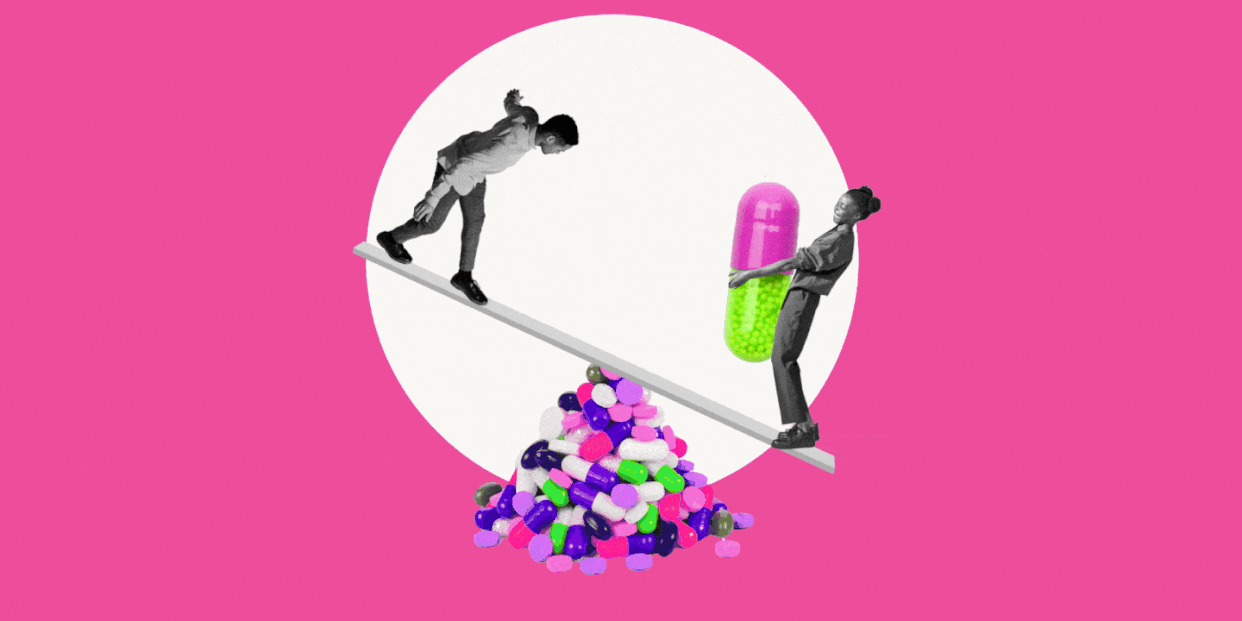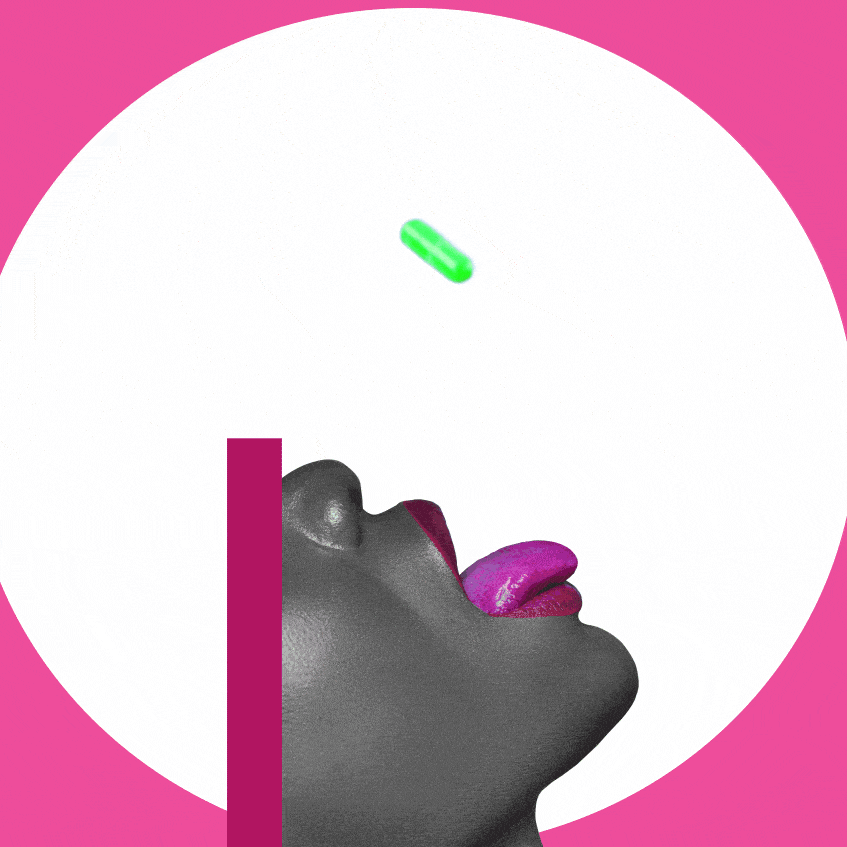What does the future of the pill look like?

Perhaps it was telling that, in the lead-up to this particular revolution, there were no banners. There was no marching on the streets, no strewn placards and no real protest. It didn’t sound like fury or fear or chanting; rather, it was the simple rattle of tablets being popped out of their cases and gently into mouths. When the pill launched in the UK in 1961 (before being made more widely available to single women in 1967), revolution looked more like this: a queue of people one morning outside a local pharmacy, quietly transforming their worlds.
There was, of course, some resistance – male religious and medical figures argued that it would drag down moral values. But there was no stopping the force of it: for women, now armed with reliable, safe contraception, it was truly liberating. And by 1967, 12.5 million women worldwide were already taking it. The knock-on effects were vast: improvements to health, career progression and the simple notion of having more autonomy over our own lives is a legacy that still stands today. Indeed, the pill is often hailed as the biggest single contributor towards gender equality to date.
Having just celebrated its 60th birthday, the pill is still the most commonly used contraceptive in the UK, with an estimated 28% of girls and women aged 15 to 49 currently taking it as their main form of contraception. Data obtained by The Guardian under the Freedom of Information Act showed that, in 2017-18, more than 3.1 million women in England alone took the combined or mini-pill daily – that’s more than nine in 10 women who receive contraception from their GP or pharmacies.
However, in the decades since the 1960s, its reputation has faltered. No longer a symbol of freedom, the pill is now often perceived as little more than a daily chore or, worse, an enemy armed with side effects – headaches, mood swings, loss of libido... the list goes on. As a result, we’ve seen rhythm-method-based fertility trackers and devices begin to dominate the rising femtech market. We’re also beginning to question why, during an age of rapid medical discovery (and one in which trials for male contraceptives were stopped for having similar side effects to those we face), there are still so many problems with the pill. Don’t we deserve better? What do the next 60 years hold for it? I set about meeting those at the forefront and discovered it’s not quite as simple as it seems...
SIDE EFFECTS AND SETBACKS
Like many women now in their thirties, I was first prescribed the pill as a teenager in the early 2000s. Back then, it was a rite of passage, the connotation being that you were not only an adult, but wild and perhaps even wildly desired – a revolution in itself for the sexually unawakened. But slowly our opinion began to change, a growing feeling – throughout my twenties in the 2010s – that the pill wasn’t quite fit for purpose.
‘Where a medicine is so successful, it doesn’t take long for the negative effects to be the main focal point of press and discussion around it,’ says Dr Cheryl Fitzgerald, a consultant gynaecologist at Manchester University NHS Foundation Trust, who spent years studying the pill following her medical degree and is currently leading a truly pioneering trial of a new contraceptive that could further sexual equality. For the pill, those negatives were its side effects – including weight gain, risk of high blood pressure, blood clots and even links to breast cancer.
Recently, a study carried out by researchers at Oxford University, revealed that taking progesterone-only contraception increases the risk of developing breast cancer by 20 to 30%. But, it's important to note that this doesn't *actually* mean that 30% of women on the mini pill will get breast cancer after taking it, rather that hormonal contraceptive use could increase your already low chance of developing breast cancer by 20 to 30%, compared to the risk you started with.
Thankfully, Fitzgerald explains that ‘lots of money was poured into trying to prevent so many side effects’, which manifest differently in different bodies. Factors such as our genetic make-up, weight, lifestyle (behaviours such as smoking, for example, can be more dangerous if taking the combined pill) can all contribute to how it interacts with our bodies. And, while we know that sex drive and mood can be affected, measuring exact causation from the pill is difficult – it also depends on what else is occurring in our lives at any one time.
When we’re taking a synthetic hormone every day, it can be easy to blame everything on that little pill packet. ‘The other thing people forget is that, actually, in your normal cycle, your hormones are going all over the place, regardless of whether we’re putting them in our bodies via the pill or other contraception or not,’ says Fitzgerald. ‘Mood swings are present even in a spontaneous [or “natural”] menstrual cycle, where hormones move all over the place.’

IS IT REALLY THE PILL’S FAULT?
When I was 16, I was convinced the pill was the source of my very emotional temperament. Looking back now, I can see that my home life was in disarray and had been for years.
Plus, I was a teenager enduring the inevitable ups and downs and side-to-sides of puberty. But maybe it was the pill – or, at least, maybe it didn’t help. Researchers at Harvard University have found that adolescent girls are more likely to experience feelings of depression while taking the pill – it can cause real emotional turmoil in our lives. The trick is, as I – and many of my peers – was told, is ‘finding the one that suits you’. There are currently 23 combined (containing artificial oestrogen and progesterone) or mini-pill (progesterone-only) brands available, each containing different levels of hormones, and Fitzgerald says that ‘a lot of the side effects [experienced] can be reduced by changing which pill you take’.
HAVE WE FORGOTTEN ITS VALUE?
There are genuine benefits to being on the pill. Long-term use can significantly lower your risk of ovarian cancer, as well as help to prevent ovarian cysts. The combined pill Dianette – or co-cyprindiol – is frequently prescribed for severe acne. In fact, many can be good for the skin and for helping to manage chronic conditions such as endometriosis by regulating hormones. But, with GP surgeries at capacity, finding the pill that’s right for you may not be easy. It’s why platforms such as The Lowdown – essentially, Tripadvisor for contraceptive pills – have sprung up in the past few years. Founded by Alice Pelton in 2019, and now with more than 80,000 users, The Lowdown compares and contrasts experiences to try to find patterns, as well as helping to gather research for future medical innovations. It’s ideas such as this, more than half a century after its launch, that could influence the next generation of the pill.
Of course, there are also innovations in access. A daily progestogen-only pill, Lovima, is now available over the counter. (Progestogen is a synthetic version of the natural hormone progesterone.) ‘[It’s] taking away the hassle and anxiety of having to go to your GP,’ explains registered pharmacist and CEO of healthcare company Maxwellia, Anna Maxwell, who worked to have this version of the pill reclassified. ‘Essentially, what we do when we take a product from prescription to non- prescription is to make it really easy for the person and the pharmacist to decide whether or not it’s suitable.’
This is the 21st century, after all, and having to go through your GP is, to use Anna’s word, ‘antiquated’ – this is not an illness that needs treating. She says that because it’s progestogen- only, Lovima is suitable for breastfeeding women, smokers and people who are overweight, unlike the combined pill. ‘No need for monitoring and no blood pressure check,’ Anna adds. Obviously, convenience comes at a cost; there are women who can’t afford to pay for it – and of course, those who feel we shouldn’t have to.
Meanwhile, in the United States, one start-up was awarded $13 million by the Bill and Melinda Gates Foundation to fund their attempt to make the pill safer and more accessible for women in environments where it’s not always possible or desirable to take a daily pill. Taken just once per month, it would be less laborious for the user. It’s currently undergoing testing at the Massachusetts Institute of Technology, but may not be available for many years.
THE FUTURE IS IN TRIAL
In the meantime, the short-term future of the pill really depends on what other contraceptive options are competing with it – namely the male pill. Despite the widespread criticism that followed when trials on several prototypes were stopped because of side effects such as headaches and acne, it’s worth noting that a participant in one trial took his own life.*
It’s also notoriously difficult to get a new medical product on to the market, as it has to go through numerous vigorous clinical trials – at least three, each of which could take months or years to complete – before it can be considered by medical bodies. This is where the research led by Fitzgerald comes in. She and her team in Manchester are part of an international effort to develop a male contraceptive that could level the playing field when it comes to sexual health. The new drug could ‘basically work in the same way the pill does,’ explains Fitzgerald. While the pill ‘switches off the ovaries, the testes would be switched off for men’, via a device not dissimilar to a mini spray-on deodorant administered on each shoulder daily. Among the couples trialling the contraceptive, there have been no pregnancies and any side effects have been well tolerated. Trials will continue; however, even if they’re successful, it could be another 10 years before we see the drug on the market.
For now, perhaps it’s time for a little reflection on the pill’s legacy and our future relationship with it. More choice, more understanding, better access and nuanced discussion should all be a part of that, but perhaps what is shaping our own connections with hormones and how they affect our behaviour is less about our own perceptions than it is about the wider world, and our continued fight for women’s voices to be heard and our bodies to be safe. The pill paved the way for an equal future, but it can only get us so far. Does the pill – our ‘daily dose of freedom’ as it was dubbed all those decades ago – need another revolution? No. But just maybe, it’s time for the next step.
Fancy a deep dive into the history of contraception? Check out this timeline...
*The researchers said the death was unrelated to the study
You Might Also Like

